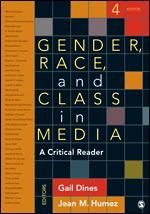Gender, Race, and Class in Media
A Critical Reader
Student Resources
This site is intended to enhance your use of Gender, Race, and Class in Media by Gail Dines and Jean M. Humez. Please note that all the materials on this site are especially geared toward maximizing your understanding of the material.
Acknowledgments
We gratefully acknowledge Gail Dines and Jean M. Humez for writing an excellent text and for reviewing the assets on this site. Special thanks are also due to Laura Hahn at Humbold State University for creating the materials on this site.
Part I: A Cultural Studies Approach to Media: Theory
eFlashcards: These study tools reinforce your understanding of key terms and concepts that have been outlined in the chapters.
Video Links: Carefully selected, web-based video resources feature relevant interviews, lectures, personal stories, inquiries, and other content for use in independent or classroom-based explorations of key topics.
Web Resources: These links to relevant websites direct both instructors and students to additional resources for further research on important chapter topics.
Part II: Representations of Gender, Race and Class
eFlashcards: These study tools reinforce your understanding of key terms and concepts that have been outlined in the chapters.
Video Links: Carefully selected, web-based video resources feature relevant interviews, lectures, personal stories, inquiries, and other content for use in independent or classroom-based explorations of key topics.
Web Resources: These links to relevant websites direct both instructors and students to additional resources for further research on important chapter topics.
Part III: Reading Media Texts Critically
eFlashcards: These study tools reinforce your understanding of key terms and concepts that have been outlined in the chapters.
Video Links: Carefully selected, web-based video resources feature relevant interviews, lectures, personal stories, inquiries, and other content for use in independent or classroom-based explorations of key topics.
Web Resources: These links to relevant websites direct both instructors and students to additional resources for further research on important chapter topics.
Part IV: Advertising and Consumer Culture
eFlashcards: These study tools reinforce your understanding of key terms and concepts that have been outlined in the chapters.
Video Links: Carefully selected, web-based video resources feature relevant interviews, lectures, personal stories, inquiries, and other content for use in independent or classroom-based explorations of key topics.
Web Resources: These links to relevant websites direct both instructors and students to additional resources for further research on important chapter topics.
Part V: Representing Sexualities
eFlashcards: These study tools reinforce your understanding of key terms and concepts that have been outlined in the chapters.
Video Links: Carefully selected, web-based video resources feature relevant interviews, lectures, personal stories, inquiries, and other content for use in independent or classroom-based explorations of key topics.
Web Resources: These links to relevant websites direct both instructors and students to additional resources for further research on important chapter topics.
Part VI: Growing Up With Contemporary Media
Video Links: Carefully selected, web-based video resources feature relevant interviews, lectures, personal stories, inquiries, and other content for use in independent or classroom-based explorations of key topics.
Web Resources: These links to relevant websites direct both instructors and students to additional resources for further research on important chapter topics.
Part VII: Is TV for Real?
eFlashcards: These study tools reinforce your understanding of key terms and concepts that have been outlined in the chapters.
Video Links: Carefully selected, web-based video resources feature relevant interviews, lectures, personal stories, inquiries, and other content for use in independent or classroom-based explorations of key topics.
Web Resources: These links to relevant websites direct both instructors and students to additional resources for further research on important chapter topics.
Part VIII: Interactivity, Virtual Community and Fandom
eFlashcards: These study tools reinforce your understanding of key terms and concepts that have been outlined in the chapters.
Video Links: Carefully selected, web-based video resources feature relevant interviews, lectures, personal stories, inquiries, and other content for use in independent or classroom-based explorations of key topics.
Web Resources: These links to relevant websites direct both instructors and students to additional resources for further research on important chapter topics.
General Resources
Articles from Prior Editions
Included are twenty articles from the previous editions that are not found in the revision.
Learning From SAGE Journal Articles
A “Learning From SAGE Journal Articles” feature provides access to recent, relevant full-text articles from SAGE’s leading research journals. Each article supports and expands on the concepts presented in the chapter. This feature also provides discussion questions to focus and guide student interpretation.

